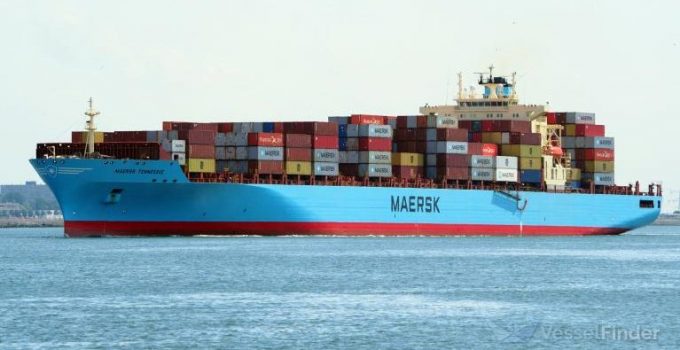RTR: Maersk sees global trade growth rising as much as 7% in 2025, exec says
REUTERS reports: Maersk expects global trade growth rising as much as 7% next year, bolstered by ...
FDX: ABOUT USPS PRIVATISATIONFDX: CCO VIEWFDX: LOWER GUIDANCE FDX: DISRUPTING AIR FREIGHTFDX: FOCUS ON KEY VERTICALFDX: LTL OUTLOOKGXO: NEW LOW LINE: NEW LOW FDX: INDUSTRIAL WOESFDX: HEALTH CHECKFDX: TRADING UPDATEWMT: GREEN WOESFDX: FREIGHT BREAK-UPFDX: WAITING FOR THE SPINHON: BREAK-UP ALLUREDSV: BREACHING SUPPORTVW: BOLT-ON DEALAMZN: TOP PICK
FDX: ABOUT USPS PRIVATISATIONFDX: CCO VIEWFDX: LOWER GUIDANCE FDX: DISRUPTING AIR FREIGHTFDX: FOCUS ON KEY VERTICALFDX: LTL OUTLOOKGXO: NEW LOW LINE: NEW LOW FDX: INDUSTRIAL WOESFDX: HEALTH CHECKFDX: TRADING UPDATEWMT: GREEN WOESFDX: FREIGHT BREAK-UPFDX: WAITING FOR THE SPINHON: BREAK-UP ALLUREDSV: BREACHING SUPPORTVW: BOLT-ON DEALAMZN: TOP PICK

Maersk’s new fossil fuel fee (FFF), which replaces its bunker adjustment factor (BAF) and low-sulphur (LSS) surcharges, appears to be more costly outcome for shippers, and to the carrier’s advantage.
On 31 May, Maersk announced the FFF and since 1 July, all new contracts with more than three months’ validity have been quoted including the new fee.
To calculate FFF, the Danish carrier uses Platts’ fuel price index for 0.5% sulphur fuel oil (VLSFO) and 0.1% sulphur fuel oil (LSMGO).
Using this methodology for the period of 11 May to 10 August, Maersk yesterday updated the FFF to an average $586.59 per ton for VLSFO and $750.28 per ton for LSMGO from 1 October.
Pre-existing contracts that include the previous surcharges remain valid until renewal, when they will transition to the FFF. Therefore, Maersk has continued to publish its BAF and LSS tariff rates, which from 1 October will see the BAF and LSS for VLSFO average $584.27 per ton and the LSS for LSMGO at an average of $742.68.
That means the FFF is an average $2.32 more expensive than the BAF and LSS for VLSFO, and an average $7.60 more than the LSS for LSMGO.
It is important to note that the different calculation periods for the adjusted FFF, BAF and LSS tariffs may have influenced the fuel price discrepancy.
However, Maersk had previously quoted the same average $621.98 fee for VLSFO in a FFF update from 11 February to 10 May, and a BAF update from 26 February to 25 May – indicating that the two-week lag has little impact on fuel price (but this of course may differ, depending on the period).
One source has told The Loadstar the switch to the FFF was likely geared towards helping Maersk recoup “the huge extra cost of methanol”, adding that it sounded very much “like a clever way to wrap up this cost”.
They added: “I think many shippers will be suspicious, particularly when carriers are clearly taking advantage.”
But Maersk told customers: “Our goal is to bring ease and connectivity to your logistics. We believe that the simplification of one surcharge related to fuel on ocean will offer multiple benefits.”
Listen to this clip from The Loadstar Podcast to hear why shippers see ports as a vital referee in the fair management of data – Stefan Krattiger, Business Development Leader Global Ports, Supply Chain Operations , IKEA Supply AG, speaking to Mike King:
Comment on this article